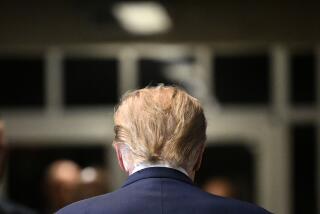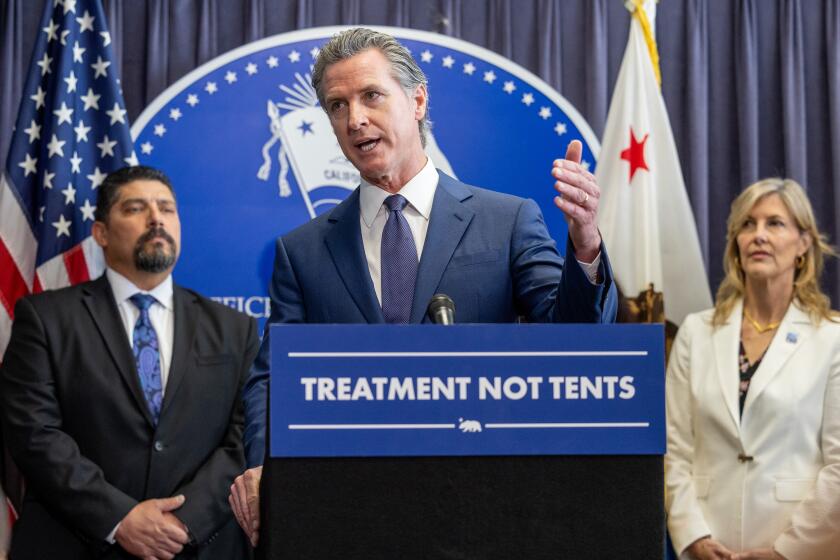Hope outrunning experience in primary race
Michelle Obama bristled at charges that her husband was not experienced enough for the presidency.
“We’ve heard this spewed from the lips of rivals every phase of our journey: He is not experienced enough, he should wait his turn,” she recently told supporters of Sen. Barack Obama (D-Ill.), who at 45 is serving his first Senate term. Only political insiders, she said, would look at his life accomplishments “and dare to have the audacity to say he is not ready.”
Experience -- and how to measure it -- has become one of the first big debating points of the 2008 presidential race.
In one of the curiosities of the Democratic primary, some of the candidates with the most experience in national politics are at the bottom of the early popularity surveys. By contrast, Obama, with a mere three years on the national stage, is this year’s campaign-trail sensation.
And so Sen. Christopher J. Dodd of Connecticut (with 33 years in the House and Senate) has been trying to heighten the importance of Washington knowledge, making a constant refrain of his claim that President Bush proves the dangers of on-the-job training in the White House. “I think people do care about experience,” Dodd said.
Gov. Bill Richardson of New Mexico (15 years in the House, two years as U.N. ambassador, three years as energy secretary) touts his “unparalleled experience.” And Sen. Joseph R. Biden Jr. (35 years in the Senate) has said of his campaign rivals: “It’s not so much whether I can compete with their money, but whether they can compete with my ideas and my experience.”
Even former Sen. John Edwards of North Carolina, who served a single term before opening a White House bid in 2004, has brought his twist to the issue. Asked at an event last month how he differed from Obama, Edwards said: “Experience. I’ve been through a presidential campaign.”
Advocates for Obama, as for other candidates who are positioning themselves as outsiders to Washington’s political culture, like to say that the range of their life experiences makes them more fit for office than those who have spent their careers in government. In Obama’s case, that resume includes stints as a community organizer, law professor, civil rights attorney and eight-year member of the Illinois state Senate.
Obama’s allies also assert that a wealth of government experience did not make Vice President Dick Cheney or former Defense Secretary Donald H. Rumsfeld any wiser in confronting the nation’s problems. And Obama launched his campaign from Springfield, Ill. -- a city identified with Abraham Lincoln -- perhaps to remind voters that one of the country’s greatest presidents had little Washington experience before he reached the White House. (Lincoln had served one House term and 12 years in the Illinois Legislature.)
Among conservative voters, experience is prized. “Republicans generally believe, particularly conservatives, that we are electing a wartime president, so experience will be critical,” said GOP political consultant Christopher Barron. “It’s one of the reasons you continue to see someone like Rudy Giuliani over-performing among conservatives who disagree with him on a litany of social issues.”
Giuliani, a former New York City mayor and federal prosecutor, built a national reputation as a steady leader after the Sept. 11 attacks. He leads in several early polls of Republican voters.
Democratic voters have been more willing to sacrifice experience for other qualities, such as a candidate’s ability to inspire the public, some analysts say. “The essential tension in the race is between hope and experience,” Jennifer Duffy of the nonpartisan Cook Political Report said of the Democratic primary campaign. “Every 25 years or so, we elect a president who gives us hope.”
With the latest CBS News poll showing that only 26% of Americans think the country is moving in the right direction, Duffy said, this may be an election in which inspirational candidates triumph.
To some degree, history bears out the idea that too much Washington experience can harm a candidate’s image. “The irony is that the longer you serve in the U.S. Congress, the lower odds are you can get elected president,” said UCLA political scientist Mark A. Peterson. “Nobody since John F. Kennedy has gone from the legislative branch to the White House.”
Members of Congress sometimes talk in an arcane language of amendments, earmarks and resolutions that makes them less than approachable to voters. Ross K. Baker, a political scientist at Rutgers, says Sen. John F. Kerry, who had represented Massachusetts for 20 years, lost his audience at a 2004 Democratic primary debate in the first moments when he trumpeted the fact that he had introduced an amendment to a Biden bill.
Still, some historians argue that prior Washington experience is helpful to a president, even though several who had limited contact with the federal bureaucracy did well.
“With Lincoln as the exception, what you find is that the experienced do perform better,” said Bruce Schulman, a political historian at Boston University.
The willingness even to entertain selecting an outsider for the nation’s highest office may be a trait that the United States shares with few other countries. “If you go to England or France or Germany, rarely is it conceivable to see heads of government and ministerial positions without extensive government experience,” Peterson said. “This is deeply rooted in the nature of modern American politics.”
“There’s a schizophrenia of the American political mind,” said Jamie McKown, political scientist at the College of the Atlantic in Bar Harbor, Maine. “We want to have a beer or a cup of coffee with the candidates, but if they can’t point out Tajikistan on a map, we’re suspicious. We want them to be everyday people and superhuman.”
Bill Clinton, a former governor and attorney general of Arkansas, won the White House in 1992 running against more-seasoned political resumes with his formidable communications skills -- an ability to act both as just “one of the guys” and a policy-loving Rhodes scholar.
“Either you prove to be an effective or ineffective campaigner,” Baker said. “That’s the difference: the extent to which you can connect with voters.”
Some think that Obama’s fresh face will help him on that front.
“Most voters want something new,” said Democratic consultant Donna Brazile, who managed then-Vice President Al Gore’s presidential campaign in 2000. “They want less D.C. experience and more good values.”
More to Read
Get the L.A. Times Politics newsletter
Deeply reported insights into legislation, politics and policy from Sacramento, Washington and beyond. In your inbox three times per week.
You may occasionally receive promotional content from the Los Angeles Times.






